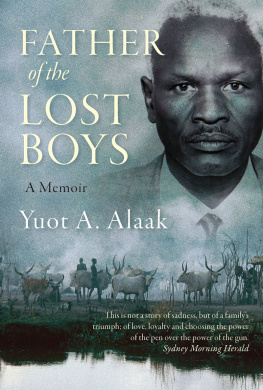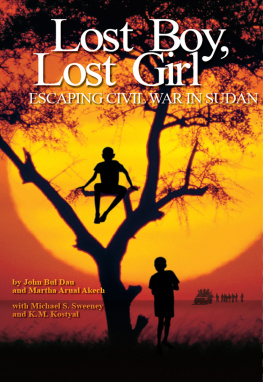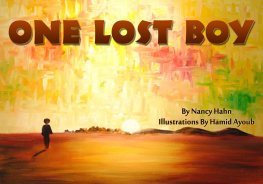ADVANCE PRAISE FOR THE LOST BOYS OF SUDAN
The journey of the Lost Boys of Sudan is both heartbreaking and inspiring. It speaks to the strength of the human spirit to survive and grow under even the most abject circumstances. Their plight eloquently shows us the terrible consequences for children of war, and their personal triumphs over adversity symbolize a great hope for Africa and the global community.
Former President JIMMY CARTER, winner of the 2002 Nobel Peace Prize
A compelling story about four courageous and persistent young men who overcame enormous adversity before arriving in the United States. I am especially taken by the Lost Boys intense desire to gain a college education and by the personal sacrifices they are willing to make to achieve their goal. I find The Lost Boys of Sudan to be an excellent introduction to a remarkable group of newcomers to this nation of immigrants and refugees.
GEORGE RUPP, president of the International Rescue Committee
In this moving tale of two years in the life of four so-called Lost Boys resettled from Sudan in Atlanta, Georgia, Mark Bixler brings the story of the American dream screeching up to the minute. The four young men are not typical refugees. They arrive in Atlanta after a childhood separated from their parents and spent wandering through the charnel house of Sudans civil war. They have dodged bullets and been hunted by hyenas. They know nothing of flush toilets, air-conditioners, or automobiles, but they have a dream to get an education. Without sentimentalizing their journey, Bixler has written a book that is sometimes sad, sometimes funny, but most of all deeply inspiring.
DEBORAH SCROGGINS, author of Emmas War: An Aid Worker, a Warlord, Radical Islam, and the Politics of OilA True Story of Love and Death in Sudan
Mark Bixler shows what the refugee experience is like for tribal, traditional, and traumatized people as they crash into modern America. While there are quite a few books on the Sudanese in America, this is the one that connects personal stories to history, foreign policy, and public policy. Its erudite and readable, a rare combination.
MARY PIPHER, author of The Middle of Everywhere: The Worlds Refugees Come to Our Town
A touching story of survival, faith, tenacity, courage, and optimism both before and after the Lost Boys resettled in America. A worthy read!
RALSTON H. DEFFENBAUGH JR., president of Lutheran Immigration and Refugee Service
This is a remarkable book that everyone interested in the Sudan should read. With insight, compassion, and integrity, Mark Bixler weaves together complex threads of extraordinary developments that, for many children, span a decade: the outbreak of a genocidal war that uprooted thousands of children, and the remarkable survival of significant numbers of these children against human foes, wild beasts, and dangerous waters. Although it is an account of tragedy, it is as entertaining as it is educational. The story is well told and well documented.
FRANCIS MADING DENG, professor of international politics, law, and society at the Johns Hopkins University School of Advanced International Studies; former Sudanese Minister of State for Foreign Affairs and Sudanese ambassador to the United States, Canada, and the Scandinavian countries; representative of the UN Secretary-General on Internally Displaced Persons from 1992 to 2004
A compelling account of the extraordinary hardships the Lost Boys underwent in Sudan, Ethiopia, and Kenya and the at times wrenching difficulties they encountered after coming to the United States. In addition to chronicling the experiences of several of those boys, Bixler provides essential background about the civil war that led to the uprooting of millions of southern Sudanese and about U.S. policy toward refugees. The Lost Boys of Sudan should appeal not only to readers drawn to the dramatic story that unfolds in its pages, but also to U.S. government officials and private organizations involved in refugee resettlement who want to improve their programs.
DONALD PETTERSON, former U.S. ambassador to Sudan and author of Inside Sudan: Political Islam, Conflict, and Catastrophe
Mark Bixlers fascinating narrative follows four young men coming of age as they navigate from a past that saw the slaughter of their families, the destruction of their communities, their flight to years of temporary asylum, their childhood denuded of adult assistance and supervision, in at best a fourth-world environment, to, suddenly, the most complex and competitive society on earth. Bixler also plumbs the strategic limits of American society; the rescue and resettlement of individual refugees such as these is tied to the principled oversoul of America. These young men will succeed here; as they do, we succeed too.
ROGER WINTER, executive director of the U.S. Committee for Refugees from 1981 to 2001 and assistant administrator for democracy, conflict, and humanitarian assistance at the U.S. Agency for International Development
THE LOST BOYS OF SUDAN
2005 by The University of Georgia Press
Athens, Georgia 30602
All rights reserved
Set in Garamond Pro
Printed and bound by Maple-Vail
The paper in this book meets the guidelines for permanence and durability of the Committee on Production Guidelines for Book Longevity of the Council on Library Resources.
Printed in the United States of America
09 08 07 06 05 C 5 4 3 2 1
Library of Congress Cataloging-in-Publication Data
Bixler, Mark, 1970
The lost boys of Sudan : an American story of the
refugee experience / Mark Bixler.
p. cm.
Includes bibliographical references and index.
ISBN 0-8203-2499-X (hardcover : alk. paper)
1. RefugeesSudan. 2. RefugeesGeorgiaAtlanta. 3. OrphansSudan. 4. War. I. Title.
HV640.4.S73B59 2005
962.4043dc22 2004026942
British Library Cataloging-in-Publication Data available
ISBN for digital edition: 978-0-8203-4620-5
To Arden Layne Bixler, with hope for the future
Learning is good
We have found it so,
Learning is the best
We have found it so.
I will not leave the school
I am a man
I have liked it;
I will not leave the school.
I am a gentleman of the future.
Those children who run away
They have no hearts
They do not even bid their masters farewell;
Those children who run away
They have no hearts.
Even if we tire
We shall endure.
We shall find its sweetness later on;
Even if we tire
We shall endure
To find its sweetness later on.
Gentlemen of the Future, a song sung in the 1940s by some of the first children in southern Sudan to receive a formal education









